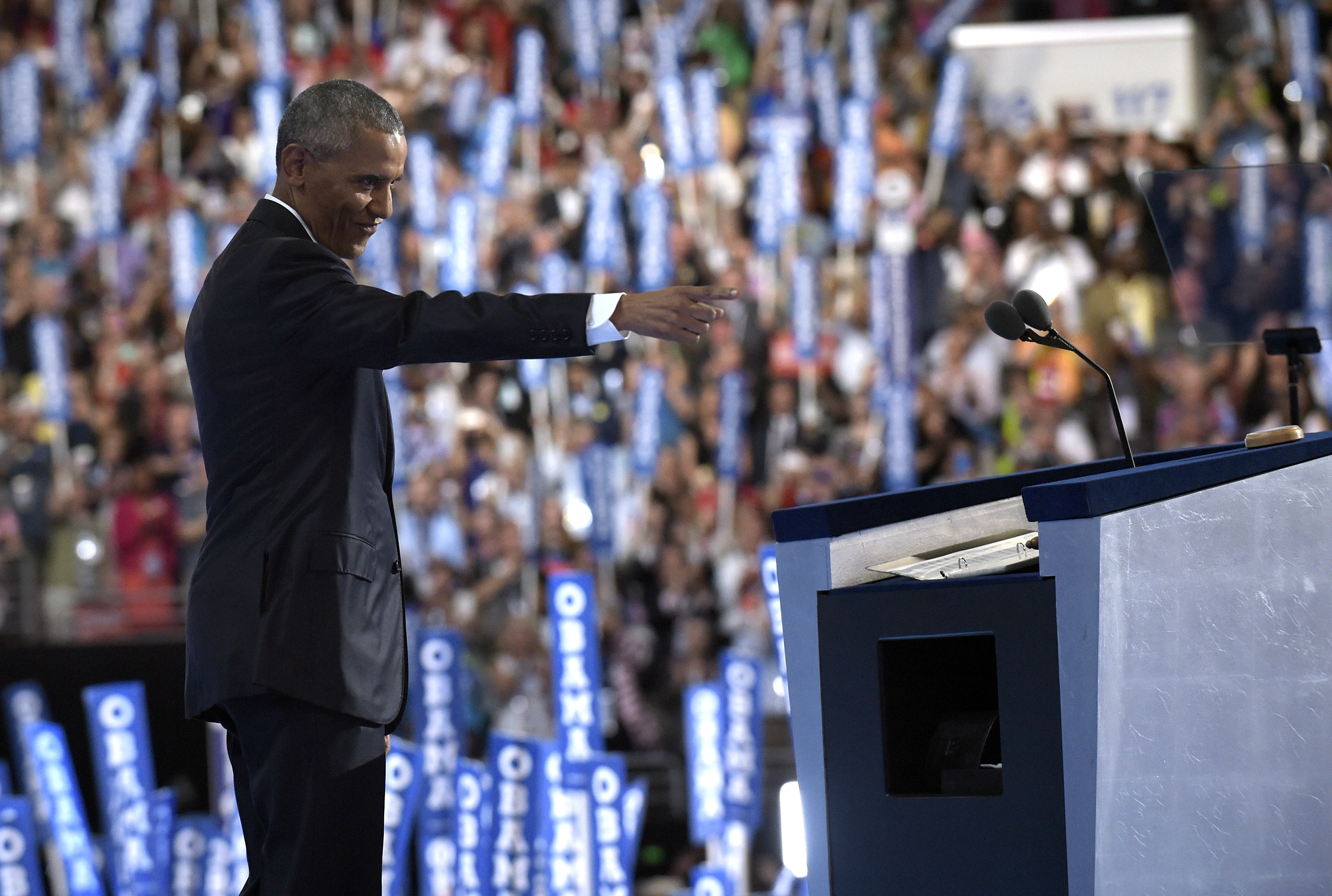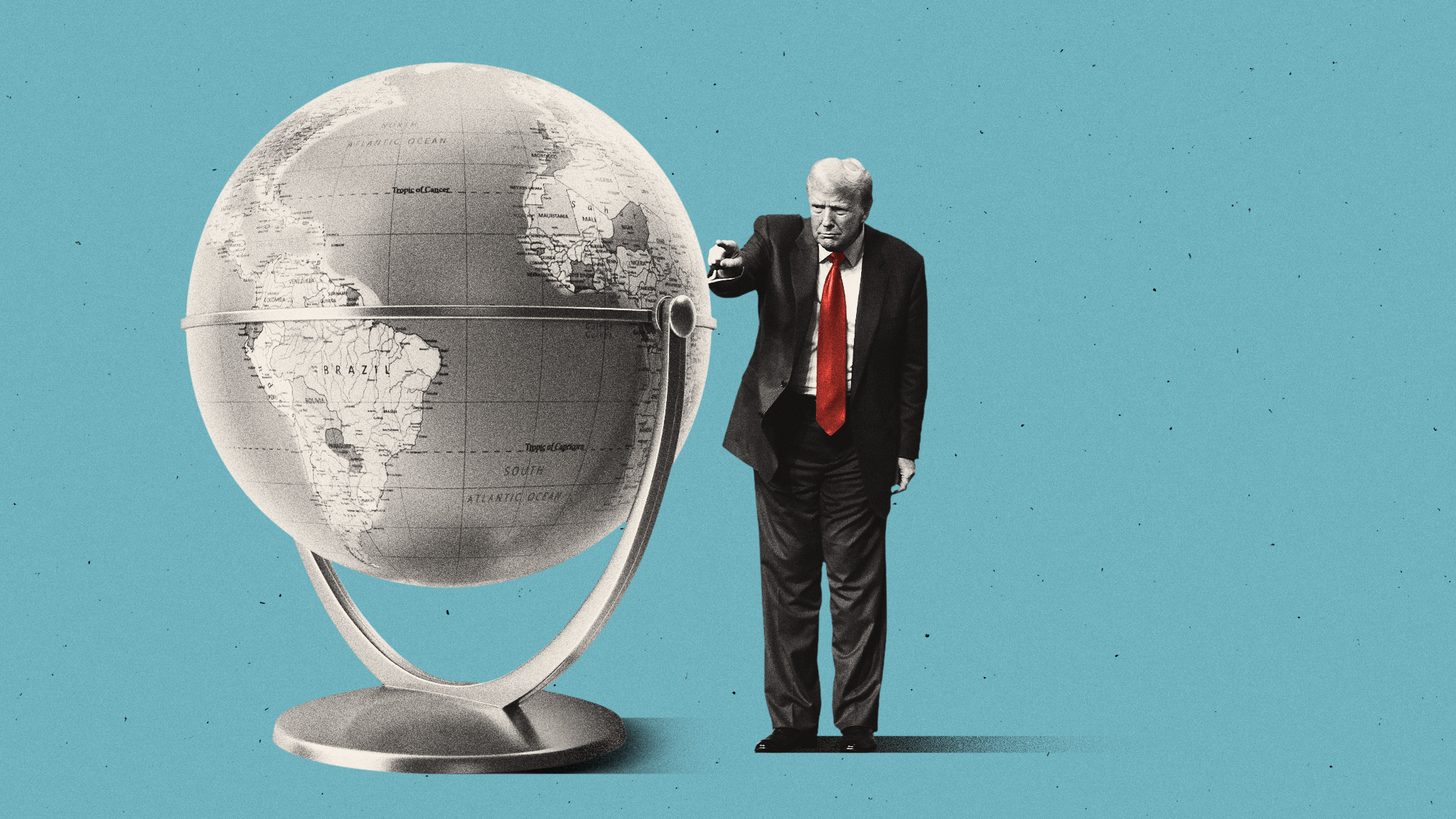How Barack Obama taught Democrats to tell their American story
Obama's convention speech was not just a rebuke to Donald Trump. It was a powerful articulation of progressive patriotism.


On a July night in Boston in 2004, a 42-year-old state senator gave what we can understand now as probably the most important convention speech in our history, a thunderbolt that made the entire political world sit up and say, "Holy cow. That guy's going to be president one day." Twelve years later, his hair greyer and his face more wrinkled, he gave another convention speech on someone else's behalf. If he had been waiting much of his life to make that speech during John Kerry's convention, the speech he gave for Hillary Clinton was obviously one he'd been waiting to make for the duration of this campaign, if not longer. Watching the rapturous crowd and hearing his unmatched combination of eloquence and delivery, it was hard to avoid the conclusion that Barack Obama will cast an awfully long shadow over Hillary Clinton, should she be fortunate enough to win in November.
Obama's speech was not just a rebuke to Donald Trump's apocalyptic vision of our country, though it certainly was that. Even more, it was a powerful articulation of the progressive version of the American story, and an assertion of patriotism every ounce as strong as that of those who have for eight years questioned whether he is truly American.
There were many compelling passages in Obama's speech, but I want to point to this one, where he directly took on not just Donald Trump himself but the kind of unease about change that Trump has attempted to harness for his benefit. When Trump says he'll "make America great again," he's speaking to people who don't like hearing Spanish spoken on the streets of their town, or who don't like seeing a black man in the Oval Office, or who don't like feeling that they and theirs no longer have a monopoly on economic, political, and cultural power. Trump's telling them that he'll turn back the clock to a time when America felt like it belonged to them. This was Obama's response:
The Week
Escape your echo chamber. Get the facts behind the news, plus analysis from multiple perspectives.

Sign up for The Week's Free Newsletters
From our morning news briefing to a weekly Good News Newsletter, get the best of The Week delivered directly to your inbox.
From our morning news briefing to a weekly Good News Newsletter, get the best of The Week delivered directly to your inbox.
And what my grandparents understood was that these values weren't limited to Kansas. They weren't limited to small towns. These values could travel to Hawaii; even the other side of the world, where my mother would end up working to help poor women get a better life. They knew these values weren't reserved for one race; they could be passed down to a half-Kenyan grandson, or a half-Asian granddaughter; in fact, they were the same values Michelle's parents, the descendants of slaves, taught their own kids living in a bungalow on the South Side of Chicago. They knew these values were exactly what drew immigrants here, and they believed that the children of those immigrants were just as American as their own, whether they wore a cowboy hat or a yarmulke; a baseball cap or a hijab.America has changed over the years. But these values my grandparents taught me — they haven't gone anywhere. They're as strong as ever; still cherished by people of every party, every race, and every faith. They live on in each of us. What makes us American, what makes us patriots, is what's in here. That's what matters. That's why we can take the food and music and holidays and styles of other countries, and blend it into something uniquely our own. That's why we can attract strivers and entrepreneurs from around the globe to build new factories and create new industries here. That's why our military can look the way it does, every shade of humanity, forged into common service. That's why anyone who threatens our values, whether fascists or communists or jihadists or homegrown demagogues, will always fail in the end.That's America. Those bonds of affection; that common creed. We don't fear the future; we shape it, embrace it, as one people, stronger together than we are on our own. [Obama]
For the last eight years, Obama has been making a case for a progressive patriotism, one based on the idea of "a more perfect union," that phrase from the preamble to the Constitution that he returns to again and again. It's the idea that the American story is one of constant improvement and progression toward the realization of the country's founding ideals. In that story, change isn't incidental, it's essential. And it's a fundamentally different kind of patriotic story from the one conservatives usually tell. It's why Obama frequently brings up dark periods in our country's history, like slavery (as the first lady did on Monday) or Jim Crow or McCarthyism — those periods are a critical part of the story, because they remind us what we overcame.
So over these years, Obama has taught Democrats how to clearly and unequivocally celebrate America while remaining true to their progressive values. And in the process, he turned his party into a confident one, after it had cowered in fear for a quarter-century before his arrival. It seems like a long time ago now, but during that time Democrats were constantly afraid — afraid they'd be called unpatriotic, afraid they'd be called weak on crime, afraid they'd be called tax-and-spenders, and afraid that Republicans who always seemed more skilled and more ruthless would whip the stuffing out of them.
They don't look that way anymore, do they? This may be a party that has suffered defeats at the state level (as the president's party often does), and is still in the minority in Congress. But Donald Trump's campaign of white nationalism has made Democrats more sure than ever that the future belongs to them, their broad coalition, and their inclusive vision.
And more than a few Republicans understand it too. On Wednesday evening, Tony Fratto, who served as a spokesperson for George W. Bush, tweeted, "Watching Democrats talk about America the way Republican candidates used to talk about America." As Obama neared the end of his speech, Rich Lowry, editor of the conservative National Review, tweeted, "American exceptionalism and greatness, shining city on hill, founding documents, etc. — they're trying to take all our stuff."
A free daily email with the biggest news stories of the day – and the best features from TheWeek.com
But it isn't their stuff alone, not anymore.
As Obama delivered his speech, the "Yes We Can" spirit of his magical 2008 campaign coursed through the room. Back then Democrats may have placed absurd hopes on him, believing that with a sweep of his hand and the power of his voice he could melt all opposition and solve any problem. But the true promise Obama embodied in 2008 wasn't the creation of paradise, or eight years without setbacks. It was a consequential presidency that achieved big things, won more battles than it lost, and set the government and the country on a fundamentally different path than the one it had been on.
He's made mistakes, and like anyone there are things I wish he had done differently. There are problems he hasn't devoted enough attention to, and opportunities he let pass by. But he did do some great things. And in the face of unending venom and hatred from his political enemies — to the point where, thanks in part to the man Republicans have nominated for president, he had to show his damn birth certificate to prove he's actually an American — he conducted himself with uncommon dignity, equanimity, and class.
And as was on such vivid and moving display Wednesday night, Barack Obama taught Democrats how to tell their American story. He may not have done everything his supporters hoped he would do. But did he fulfill the promise everyone saw when he took the stage at that 2004 convention? Yes he did.
Paul Waldman is a senior writer with The American Prospect magazine and a blogger for The Washington Post. His writing has appeared in dozens of newspapers, magazines, and web sites, and he is the author or co-author of four books on media and politics.
-
 The diminishing power of willpower
The diminishing power of willpowerIn the Spotlight ‘Try harder’ attitude may not be the best way to achieve long-term goals
-
 Greenland, Colombia, Cuba: where is Donald Trump eyeing up next?
Greenland, Colombia, Cuba: where is Donald Trump eyeing up next?Today's Big Question Ousting Venezuela’s leader could embolden the US administration to exert its dominance elsewhere
-
 Wilde Cambridge: home-away-from-home in a prime city spot
Wilde Cambridge: home-away-from-home in a prime city spotThe Week Recommends This laid-back aparthotel is the perfect base for a weekend of exploring
-
 Bari Weiss’ ‘60 Minutes’ scandal is about more than one report
Bari Weiss’ ‘60 Minutes’ scandal is about more than one reportIN THE SPOTLIGHT By blocking an approved segment on a controversial prison holding US deportees in El Salvador, the editor-in-chief of CBS News has become the main story
-
 Has Zohran Mamdani shown the Democrats how to win again?
Has Zohran Mamdani shown the Democrats how to win again?Today’s Big Question New York City mayoral election touted as victory for left-wing populists but moderate centrist wins elsewhere present more complex path for Democratic Party
-
 Millions turn out for anti-Trump ‘No Kings’ rallies
Millions turn out for anti-Trump ‘No Kings’ ralliesSpeed Read An estimated 7 million people participated, 2 million more than at the first ‘No Kings’ protest in June
-
 Ghislaine Maxwell: angling for a Trump pardon
Ghislaine Maxwell: angling for a Trump pardonTalking Point Convicted sex trafficker's testimony could shed new light on president's links to Jeffrey Epstein
-
 The last words and final moments of 40 presidents
The last words and final moments of 40 presidentsThe Explainer Some are eloquent quotes worthy of the holders of the highest office in the nation, and others... aren't
-
 The JFK files: the truth at last?
The JFK files: the truth at last?In The Spotlight More than 64,000 previously classified documents relating the 1963 assassination of John F. Kennedy have been released by the Trump administration
-
 'Seriously, not literally': how should the world take Donald Trump?
'Seriously, not literally': how should the world take Donald Trump?Today's big question White House rhetoric and reality look likely to become increasingly blurred
-
 Will Trump's 'madman' strategy pay off?
Will Trump's 'madman' strategy pay off?Today's Big Question Incoming US president likes to seem unpredictable but, this time round, world leaders could be wise to his playbook
